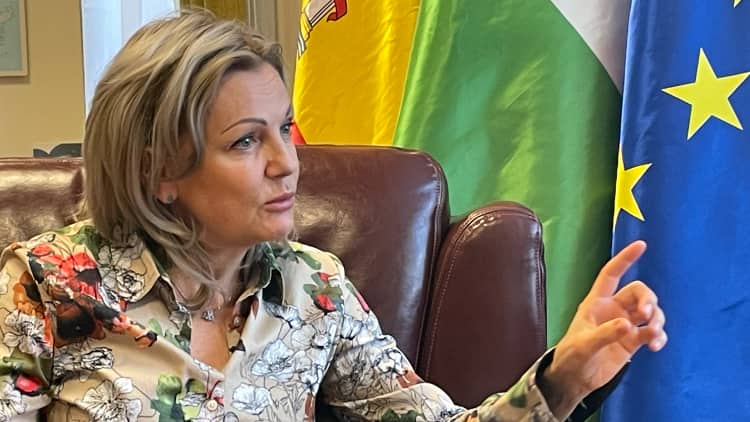Katalin Tóth
Ambassador of Hungary
Alberto Rubio
“I feel very well. It’s wonderful to be in Spain”, says Katalin Tóth in good Spanish, while praising the work of her diplomats: “Without them I would not be able to do anything. They are very capable and do an excellent job”. The Hungarian ambassador adds that “our institutional relationship with the Spanish authorities is very good. I always have the opportunity to start a dialogue, even at the highest level.
What does this good relationship mean?
Our foreign ministers have very strong and special ties. After José Manuel Albares’ arrival at the Ministry, we immediately found a date to organise a meeting between the two. They spent two hours talking about European issues, where we have a lot of common ground, such as digitalisation and the green economy. These are big issues that will have an impact on our future. That is why making progress in this dialogue is a priority for both countries, without forgetting other business, cultural and institutional ties, which are also very strong.
Are there already specific plans?
We want to dedicate funds to the green transition and the digital transition. The dialogue is also taking place at the European level, but both sides are very focused on that and we can extend that collaboration to the bilateral relationship.
Will there be investments in both countries?
We have big companies in Hungary, for example in automotive, which are long-standing partners of Hungary. And we would like to see more investments in Hungary because we have a very open economy. It would be a great success for us if more Spanish investments could take place. And at the same time it is a priority for us to find opportunities in the Spanish market for other companies that are not so big but are competitive in their sectors.
During the visit of our foreign minister we signed an agreement on Fintech (technology in banking services) and now we want to develop it and make partners, for example in water management, where we have quite advanced technology, and in the field of agriculture, where we have serious capabilities.
Will your government also find a way to get along with the EU?
Of course it will. I am very positive. I have no doubts, as it is in our common interest to maintain dialogue. The vast majority of the Hungarian population is pro-European and pro-EU, which means that we have a future within this community. This, of course, does not mean that we cannot have different opinions on some issues. In my opinion these differences can help to bring about positive changes, this has always been the engine of development throughout history. It is true that we have a special position, but we are ready for dialogue within the EU.
It does not always seem that the Hungarian government is ready for dialogue.
This is the idea that Hungary is portrayed in the media. Traditional values, family, history, Christian foundations play a very important role in our conservative politics. The current trend does not seem to me to want to respect these values. That’s why we often clash on basic issues, but that doesn’t mean that we don’t want to talk to each other.
It seems that the Visegrad countries share these more conservative views. Why is that?
We come from a common history, different from the rest of Europe, and as a bloc we have quite similar views, on which we base our cooperation. For example, on immigration we have a very strong position, which is different from the direction dictated by the EU. Immigration policy is not working and we do not have adequate answers to this increasingly complex problem since 2015. Now, out of growing concern, there are those who are raising their voices about what is happening on the Belarusian border, but we still lack common and clear answers.
Is it possible to solve what is happening on that border?
Poland’s security is at stake, but it is also the security of the EU. This is a priority for us. We have to defend our borders because an influx of illegal immigrants like this can cause big problems. We have to make changes in our way of thinking in order to find a common solution. And if we cannot find a common solution, we have to let countries act freely, but of course in accordance with EU law.
Are you talking about an à la carte migration policy?
There is no common solution at the moment. That is why we have to let the countries make proposals in this regard. There are countries for which this problem is a great challenge. For others, not so much. Spain understands this well because it has external borders.
Is a European migration policy possible without Germany’s opinion?
Obviously Germany’s opinion is important in this question. However, it is important to note that most of these migrants want to go there or to some other northern country. But would they be able to handle that flow if, by insisting on our previous policy, we let everyone in? This is such an important issue, which affects us all.
Some NGOs criticise Hungary for not respecting fundamental rights.
The dispute is about the interpretation of duties and rights. We have a duty to control our borders, which are also the borders of the EU. Those NGOs, whose activities in many cases are not entirely clear, are funded to help migration, which is completely contrary to Hungarian aspirations. We want to assess exactly what is the purpose and scope of their activities. There is often a feeling that they might want to interfere in Hungarian domestic politics.
Are you saying this because the elections are coming up?
This is independent of the elections, the sovereignty of the country is a fundamental issue. We are planning to hold the elections in April and there are many who want to increase their influence in connection with the upcoming event. This government has been in power for 11 years, which means stability, and has produced serious and important achievements. However, I think the decision should be in the hands of the voters, who will express their opinion on the performance of the last few years.







